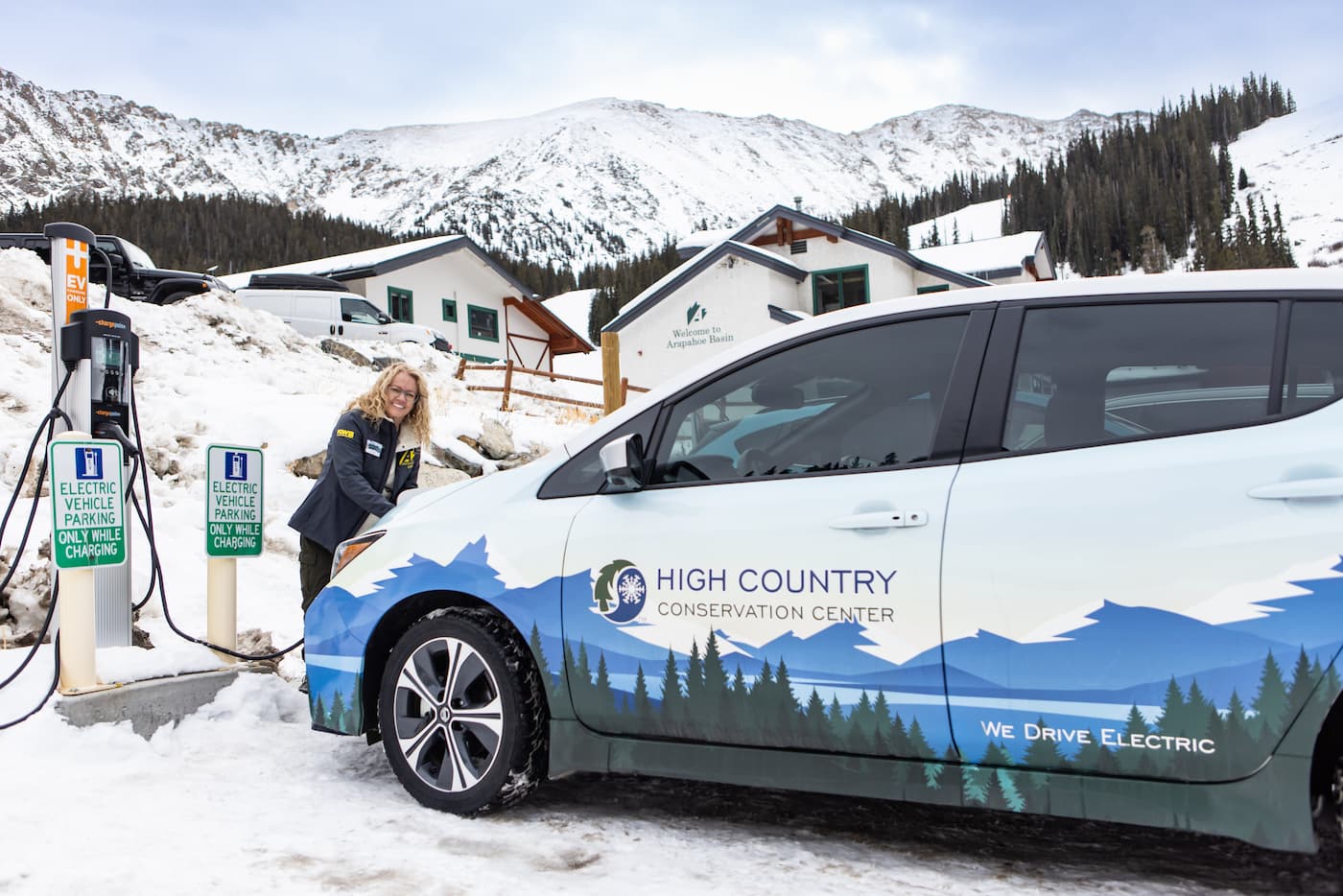
- High Country Conservation
- March 26, 2024
- Ask Eartha
Dear Eartha, can I drive an electric car in cold weather?
On any given day in Summit County, you’re sure to spot electric cars cruising the roads. Which lends an easy answer to this question: Yes, they can be driven in the cold. In fact, there are currently 861 electric vehicles (EVs for short) registered in the county, which is a 266 percent increase over 2021. Surely, if EVs didn’t work in the cold, our neighbors wouldn’t be buying them. Neither would Norwegians, for that matter. Despite average wintertime temperatures of about 20 degrees Fahrenheit, EVs made up over 90 percent of new car registrations in Norway last year. Summit County’s average winter temperatures aren’t very different, so why the cold weather concern?
Dead Batteries are Free of Charge
Whether in your phone or even your gas-powered vehicle, it’s no secret that batteries don’t like being cold. When it comes to EVs in winter, the chemical reactions inside the batteries slow down, reducing the amount of charge they can hold and, as a result, vehicle range. Blasting the heat and defroster further strain the battery. Testing by Consumer Reports showed that EV range can decline 25 – 50 percent in winter (shorter trips with frequent stops saw bigger drops in range. For context, gas-powered cars can see their fuel efficiency reduce up to 24 percent at temperatures below 20).
This may sound discouraging, but it’s important to remember that most of us aren’t driving hundreds of miles every day. Indeed, the average American drives just 37 miles daily, and the average range of new EVs sold in the US is nearly 300 miles. How does all this translate to life in Summit County? I asked several local EV drivers for their takes on navigating the snow and cold. Here’s what I learned.
Starting & Charging
A common concern for folks who don’t have garages is that an EV will be difficult to start in winter. Not so, according to local owners who leave their cars outside overnight. “I’ve never had a problem with the car starting in winter,” shared Breck local Beth Groundwater. “Some of its charge is used to keep the battery warm at night,” but it’s not significant. Adrienne Issac agreed. She doesn’t have a garage at her Dillon Valley home and has had “no car issues in the morning – or after a day of skiing.”
Charging does take longer in the cold. And everyone I spoke with recommended saving battery power by pre-heating the car while it’s still plugged in – if, of course, you’re able to charge at home. This is a huge perk for Frisco resident Jessie Burley, who loves getting into her warm car without the associated emissions from idling.
Range Anxiety
These local EV drivers confirmed that range drops in colder weather. Kasey Provorse of Frisco noted that the amount of range lost really depends on where you’re driving: “You lose a fair bit of range when you climb a mountain pass,” she said. On the other hand, because of regenerative braking,
“You also regain quite a bit when you travel down a mountain pass.” For longer distance trips, she uses an app that tells EV drivers where and how often to charge.
Busting through Snow – and Myths
My EV-driving friends reminded me that because of their battery packs, electric cars are heavier than gas-powered cars. That gives them more traction in the snow. Silverthorne resident Karn Stiegelmeier explained that “driving an EV in the winter is really not much different from any car. You need good snow tires!” Do challenges to driving electric cars still exist? Of course. Adrienne wishes there was more EV charging at multi-family buildings around the county. But there are tons of benefits. Charging at home costs Kasey about $3 a month. And both Xcel Energy and High Country Conservation Center offer rebates to install home charging, making refilling with electrons a lot more convenient. Plus state and federal incentives – including incentives for lower-income earners – provide steep discounts on the upfront cost of EVs. The final word? “Don’t make your car decisions based on worst-case scenarios,” Jessie advised. “Think about what you do on a daily basis. You probably drive to and from work, run errands, etc. This is what the EV excels at.” Yes, even in the cold.
Ask Eartha Steward is written by the staff at the High Country Conservation Center, a nonprofit dedicated to waste reduction and resource conservation. Submit questions to Eartha at info@highcountryconservation.org.
